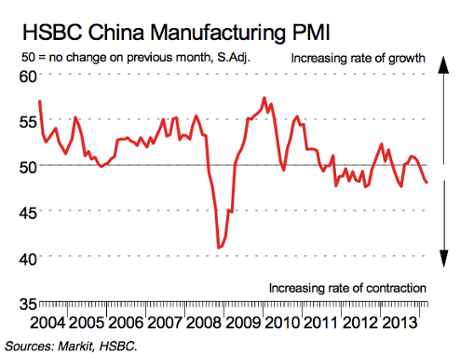Medium-sized and small firms in China are continuing to struggle to grow, adding to concerns that the Chinese economy is losing steam.
HSBC's China manufacturing PMI survey, which focuses on smaller private companies, showed that activity contracted for the third month in a row in March, at the fastest rate in eight months.
It fell to just 48.0 in March, down from 48.5 in February, showing "a moderate deterioration of the health of the sector". Any reading under 50 shows a contraction, and this is the biggest fall since July 2013.
Firms reported that output and new orders both fell, at a faster rate, while workforce numbers also fell. The survey suggests that China's domestic economy is still cooling, as new business from abroad rose for the first time in four months.
Hongbin Qu, chief economist at HSBC, argued that China's government needs to take further stimulus measures soon:
“The final reading of the HSBC China Manufacturing PMI in March confirmed the weakness of domestic demand conditions. This implies that 1Q GDP growth is likely to have fallen below the annual growth target of 7.5%. We expect Beijing to fine-tune policy sooner rather than later to stabilize growth.”
Here's the details: Key points
- Both output and new orders contract at faster rates...
- ...while new export orders return to growth
- Input costs and output charges both fall sharply

Confusingly, the 'official' Chinese PMI survey was a little more positive - inching higher to 50.3 in March from 50.2 in February. That may show that the biggest Chinese firms, and those under state control, are performing better.
But economists had hoped to see a stronger reading, as the disruption caused by the Chinese new year fades away.
IG's Evan Lucas explained:
The March read was the first read free of the Chinese Luna New Year and despite the constant expansion there are weaknesses across the domestic sector, seeing price and output contracting.

3 comments:
The Eurozone doesn't want Quantitative Easing. That's just throwing money at the Commercial Banks and praying. There is absolutely no control over where the money ends up. It can be moved to the Cayman Islands, used to pay ludicrous bonuses in the City
I have no idea of how the € zone will, implement QE. It's a daft idea.
But when "money" is created via QE we all know where it ends up. Not in the Cayman Islands, but as deposits at the central bank. They are called "reserves". And they stay at the central bank.....
Debt-free money injection could also be achieved by simply putting money directly into citizen's bank accounts. If the Bank of England had put its £350 billion of QE directly into UK citizens bank accounts, this would have given every citizen something like £7000.
Eh ? Under QE BoE bought £350bn of UK government bonds and, in return, credited the accounts of the banks selling these bonds with an equivalent amount of reserves (ie deposits with BoE, which are effectively obligations of the state). This was not a gift of money, it was a swap between one form of government debt for another. Your comparison is bogus.
Mario Draghi created over €1 trillion in cheap loans for his banker friends in the form of LTRO. That could have been used to give every Eurozone citizen €3000.
And for every €1 he lent, he borrowed €1 from the private banking sector (and pays interest on it). No creation of money. He borrowed from the banks having surplus funds, and lent them to the banks with a deficit.
Simply because the banks with a surplus weren't willing to lend directly to those in deficit, because of the risk, so he had to get in the middle and guarantee things.
He took risk, but once again, this is not "money creation". He borrowed from Germany and lent to Spain.
If you understood the recent BoE paper on these matters, you'd understand why what I have said is true. The BoE (nor any other central bank) controls credit creation directly.
A corollary of this is that no central bank can create money !
Correction.
No central bank can create money without insolvency, without the agreement of the state to recognise the money created, and credit the central bank with a balancing amount of the money created.
Which is what the state does when there is a deficit.
I was speaking about monetary system in isolation, and not addressing the fiscal policy.
Eurozone unemployment at 12% will not start to come down until next year.
There is a risk
that financial market turbulence could flare up again
Little risk that these people will find jobs then. Let's give them incentives to find those jobs that don't exist by cutting their doles.
Post a Comment